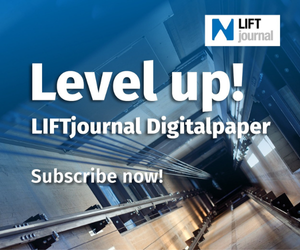A question of preparation
How much is my own company worth? Owners ask themselves this question at the latest at the end of their career. What is clear is that those who make their assessment by the book often miss the mark by a wide margin - and potentially give away a lot of money.
An analysis by Dr Lars Watermann
Actually, it resembles a minor miracle: the Corona crisis has had an iron grip on the world economy for two-and-a-half years - yet the order books of the lift manufacturers are full. The mood at the latest interlift in Augsburg was correspondingly good.
At the same time, the pandemic was and is an incentive to corporate planning. Numerous owners were prompted to think about their future and as a result the question how things would continue with their life’s work upon their departure.
Keep it in the family or sell?
Most owners decide on an internal family solution at the end of their working life. Others withdraw from the management role and appoint an outside managing director, who often also receives shares. By contrast, some owners decide on the most radical course and sell their business completely.
Knowing the precise value of the company is vital in all three scenarios. In the first two, in order to avoid arguments and not get into difficulties with the tax authorities. In the case of complete sale, above all in order to maximise the price and as a result begin a financially carefree future.
Often undervalued
However, in the event of sale, owners’ estimates of the value are often far too low. "In our case, the difference between the original estimate and final sale price was in the medium double digit range," reported Klaus-Peter Kapp, former owner of Janzhoff Aufzüge, which Kone acquired in 2015. This is because those in charge of a company know their company better than every market observer – but can scarcely imagine what strategic value their company has for one of the "Big 4" (see box).
"For buyers, such estimates are routine, but for me by contrast, it was completely new ground. Consequently, it was clear to me that I needed an experienced advisor," revealed Klaus Dralle, who sold his company to Schindler in 2017. This is because an external expert not only ensures that the process is professional, but also helps the owner to recognise the actual value of his own company.
Success endangered
"It was important to me that my advisor was a specialist in my sector," said Klaus-Peter Kapp. Decades of confidential interactions naturally often exist with one’s own lawyer and tax advisor. But precisely this, absurdly, endangers the financial success of the transaction. This is because – naturally without any bad faith – they go by the book, which in many sectors also works well.
"But even lawyers specialised in M+A seldom know what the special features and as a result at the end of the day what the assets of a company in the lift sector are. But it’s self-evident that no one would reject such a mandate, given the fee to be expected, even if he only had a rudimentary knowledge of the subject matter," concluded Klaus-Peter Kapp.
Consequently, those who cannot read the specific DNA and strategic importance of a lift manufacturer cannot properly estimate its value – and as a result possibly leave a lot of money on the table.
The author is managing director of Watermann Agens GmbH and specialised in company transaction in the lift sector. He has advised numerous lift entrepreneurs on selling their companies in the last 17 years, including Marohn, Colonia, the Eggert Group and MS Aufzugbau und –service (TKE), Janzhoff (Kone), B&T, Dralle and A.S. Aufzug + Service (Schindler).
A mixed bag: These criteria determine the value of lift companies: There are numerous myths about the valuation of lift companies. The greatest error: the sale price depends above all on the service business. Points such as the potential for modernisation, conversion and repair or the opportunity to acquire a large number of qualified experts are now just as important. This is why classic valuation approaches such as the discounted cash flow method or also the comparison with other deals from mechanical engineering fall down.
Moreover, the purchase price can also greatly increase if the seller knows the logic and needs of the other side. This begins with the formal requirements and goes all the way to the right deal speed. Moreover, the competition of the bidders requires permanent moderation and orchestration in order to obtain the best overall package at the end. In addition, the person who knows the historic purchase prices of the sector – which are of course not freely accessible – has a clear advantage.






















Write a comment